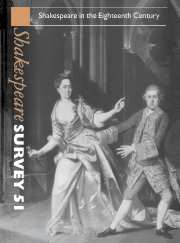Book contents
- Frontmatter
- Shakespeare and the Eighteenth Century: Criticism and Research
- Daddy’s Girls: Shakespearian Daughters and Eighteenth-Century Ideology
- Shakespeare and Clarissa: ‘General Nature’, Genre and Sexuality
- Early Georgian Politics and Shakespeare: The Black Act and Charles Johnson’s Love in a Forest (1723)
- Race Mattered: Othello in Late Eighteenth-Century England
- From Pericles to Marina: ‘While Women are to be had for Money, Love, or Importunity’
- ‘A Thousand Twangling Instruments’: Music and The Tempest on The Eighteenth-Centruy London Stage
- Double Falsehood and the Verbal Parallels with Shelton’s Don Quixote
- Eighteenth-Century Performances of Shakespeare Recorded in the Theatrical Portraits of the Garrick Club
- Eighteenth-Century Editing, ‘Appropriation’, and Interpretation
- Shakespeare Survey: Beginnings and Continuities
- Destined Livery? Character and Person in Shakespeare
- Prejudice and Law in The Merchant of Venice
- ‘Many A Civil Monster’: Shakespeare’s Idea of the Centaur
- Shakespeare’s International Currency
- Repeopling the Globe: The Opening Season at Shakespeare’s Globe, London 1997
- Shakespeare Performances in England, 1997
- Professional Shakespeare Productions in the British Isles, January–December 1996
- TheYear's Contributions to Shakespeare Studies: 1 Critical Studies
- 2 Shakespeare’s Life, Times, and Stage
- 3 Editions and Textual Studies
- Books Received
- Index to Volume 51
- General Index to Volumes 41–50
3 - Editions and Textual Studies
Published online by Cambridge University Press: 28 March 2007
- Frontmatter
- Shakespeare and the Eighteenth Century: Criticism and Research
- Daddy’s Girls: Shakespearian Daughters and Eighteenth-Century Ideology
- Shakespeare and Clarissa: ‘General Nature’, Genre and Sexuality
- Early Georgian Politics and Shakespeare: The Black Act and Charles Johnson’s Love in a Forest (1723)
- Race Mattered: Othello in Late Eighteenth-Century England
- From Pericles to Marina: ‘While Women are to be had for Money, Love, or Importunity’
- ‘A Thousand Twangling Instruments’: Music and The Tempest on The Eighteenth-Centruy London Stage
- Double Falsehood and the Verbal Parallels with Shelton’s Don Quixote
- Eighteenth-Century Performances of Shakespeare Recorded in the Theatrical Portraits of the Garrick Club
- Eighteenth-Century Editing, ‘Appropriation’, and Interpretation
- Shakespeare Survey: Beginnings and Continuities
- Destined Livery? Character and Person in Shakespeare
- Prejudice and Law in The Merchant of Venice
- ‘Many A Civil Monster’: Shakespeare’s Idea of the Centaur
- Shakespeare’s International Currency
- Repeopling the Globe: The Opening Season at Shakespeare’s Globe, London 1997
- Shakespeare Performances in England, 1997
- Professional Shakespeare Productions in the British Isles, January–December 1996
- TheYear's Contributions to Shakespeare Studies: 1 Critical Studies
- 2 Shakespeare’s Life, Times, and Stage
- 3 Editions and Textual Studies
- Books Received
- Index to Volume 51
- General Index to Volumes 41–50
Summary
As one of the editors of the Oxford Shakespeare Complete Works, I should declare an ambivalent and unmercenary interest in the Norton Shakespeare, based on the Oxford text. For the Norton editors, the value of the Oxford lies in its authoritative challenge to previous editorial practice as it is still represented in its rivals. Norton have reprinted the Oxford Textual Companion (1987) in a paperback edition (available in North America only). It is a reminder that the massive documentation in the Oxford Shakespeare Companion lies behind the Norton edition, though it remains at one remove, for the Norton edition purports to be freestanding. The Norton edition on the whole preserves the integrity of the Oxford text, and builds around it generously extensive annotations, introductions, appendices, bibliographies, and illustrations, including skeleton textual documentation for each work and a valuable essay on the Shakespearian stage by Andrew Gurr. To many, the combination of Oxford textualism, the sophisticated critical acumen of the editorial team led by Stephen Greenblatt, and the well-calculated generosity afforded by the Norton format will make this the best complete works available. The Norton edition can be considered as a major new edition in its own right, and presents a direct challenge to the Riverside and Bevington Complete Works that dominate the American market.
- Type
- Chapter
- Information
- Shakespeare Survey , pp. 302 - 338Publisher: Cambridge University PressPrint publication year: 1998

